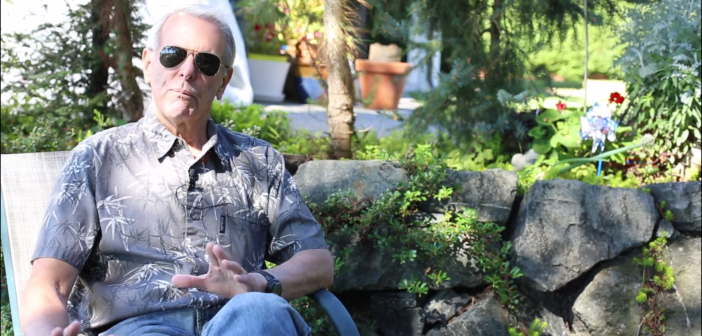In One Makes an Instrument of Themselves, and is Estranged Also, collaborators Mimi Cabell and Lindsay Foster probe the “the commercialized self, the marketized private life.” As today’s corporate landscape ostensibly reorients itself toward workers’ happiness, Cabell and Foster remind us that alienated labor is far from a historical fad.
Building on work recently shown at Minneapolis’ The Soap Factory, the duo’s installation and videos antagonize the idea of a happy worker. Cabell and Foster hope to “dislodge the viewer slightly,” which they accomplished with a live animal performance at the opening reception. A miniature horse paraded GRIN’s gallery floor, led by a woman in a burgundy windbreaker. The adorable animal rather aimlessly traversed the slush marks left by snowy shoes, circling groups of people and eating hay from a blue plastic tub.
The conceptual concerns animating this equine performance echo what Marx wrote in the first volume of Capital: “The slave-owner buys his laborer as he buys his horse.” The “slave-owner” goes by less sensational names today—boss, supervisor, team leader, even ‘motivator'—but the imbalanced power dynamic between boss and worker remains. As Herbert Marcuse suggested: “All domination assumes the form of administration.”

Installation shot of One Makes an Instrument of Themselves, and is Estranged Also
To evince this inequality, Cabell and Foster pondered the etymology of “manage.” The word derives from the Italian maneggiare (“to handle a horse”) and the French manège, meaning “horsemanship.” Management, then, equates to horse training, and workers to steed—hence the pony at the opening. The mini horse’s value resides in its cute aesthetic and ability to perform, rather than a capacity for hard labor. Paid performance is integral to most jobs in the United States as well: the services sector comprises 79.5 percent of the US economy. Innumerable emotions are demanded of workers within this sphere, from the customary politeness of servers and baristas to the more intensive situations encountered by caretakers, nurses or social workers.
The show’s title is borrowed from sociologist C. Wright Mills’ White Collar (1951), which describes a “personality market” wherein “personal or even intimate traits of the employee are drawn into the sphere of exchange and become of commercial relevance.” Cabell and Foster also cite Arlie Hochschild’s seminal tome on affective labor, The Managed Heart, and Erving Goffman’s symbolic interactionism as major influences. The latter’s micro-level account of social norms and practices, centered on the idea of a performed self, helped broaden Cabell and Foster’s understanding of ‘management.’
So, in the video Handlers, one encounters people managing not only hypothetical employees but their self-concept as well. A retail manager, teacher, physical trainer, and other leader-types role-play firing people. The letdowns are often gentle and bureaucratic, full of fluffy language to soften the harshness of a lost job. Cabell imagines the viewer asking: “Am I being fired or broken up with?”
Foster says the interviews were mostly filmed outdoors to nod at the idea that “there is no outside of work.” The artists further allude to this by installing both an outdoors and an office in the gallery, hinting at their overlap. An office chair and a grove of artificial plants occupy the room’s center. Nearby, a water cooler bubbles. This manufactured orchard might be an extremely low-budget version of Amazon’s Seattle biodomes, intended to function as morale-boosting ecosystems.
By promoting productivity as worker satisfaction, companies like Amazon can humanize a corporate agenda. Similarly, corporations can capitalize on activism to public accolades, as when Lyft donated $1 million to the ACLU in response to President Trump’s immigration ban. Such efforts can indeed be commendable, but they also naturalize corporations as participants in social or environmental justice, while eliding the more material motive of profit. Private companies then become paragons of charity, further supplying ammo for a conservative caricature of the public sector. Ellen Meiksins Wood writes of capitalism’s “constant systemic need to develop the productive forces” and “impose its imperatives on new territories and new spheres of life.” An appearance of friendliness and social concern helps achieve both aims.
The rallying cries of this smiley-faced capitalism are parodied in the exhibit’s second video, Ode to JL Seagull. A twinkly, repetitive electronic beat blips over slowly moving footage of clouds. Motivational corporate speak appears as a sequence of aphorisms. Halfway through this stream of regurgitated affirmations, a gloomier notion appears: “People die as they live.” It’s succinct, darkly funny, and quickly replaced by further bits of nonsense: “Be a player-coach,” “Escalate up,” “Accomplish your goals.”
Cabell finds that the groupthink language exemplified in Ode “attempt[s]to flatten the hierarchy” and “erase differences in class.” Affirmation becomes a brute force, a cheerful denial of difference. A conflation of self-help and a sales pitch, this vocabulary can displace the reality of affective labor. Mills calls the “tact” required for emotional labor “a series of little lies about one's feelings, until one is emptied of such feelings.”
This emotive onus is particularly exhausting for working women. As Foster notes, “Awareness of self has traditionally been a gendered dynamic. [Women are] taught to be conscious of their impact on others.” The exhibit riffs on this gendered disparity by playing with tropes of femininity and domesticity, specifically the artificial plants and pony.
In hybridizing the domestic and corporate, Cabell and Foster visualize the multiple fronts of affective labor for women. The ‘work-life balance’ is prized in neoliberal feminism as a chance for women to ‘have it all’—and yet having it all doesn’t imply any enjoyment of the spoils earned. As the emotional content of work and home life merge, women are asked to do more, perform more, be more. It’s hardly a schematic for contentment, much less liberation.
This is the gendered aspect of a more comprehensive and insidious project: the total subsumption of life into work and, ultimately, the extinction of leisure. As Eva Swidler writes, the “working-class fight against work and for leisure” was once pivotal in labor activism, as exemplified by campaigns for shorter workdays in the late nineteenth and early twentieth centuries. Things have changed: “Today the dominant idea of a working-class agenda is to fight to be allowed to sell one’s time.”
Cabell and Foster potentiate this thought. We now compete to sell not only our labor but our personalities. Entangled with the corporate lexicon of self-help, the development of the self is no longer an ontological or ethical endeavor but an economic one. Mills’ unsparing prediction for this personality market was “all-pervasive distrust and self-alienation” and a loss of “common values and mutual trust,” trends which erode a population’s civic interests and participation.
Political philosopher Nancy Fraser recently argued that contemporary capitalism prioritizes economic production over “birthing and raising children, caring for friends and family members, maintaining households and broader communities, and sustaining connections more generally.” Fraser calls this a “crisis of care,” in which people’s social capabilities are weakened by the commands of capital. It’s the outcome of Mills’ personality market: estrangement ascends from the individual level to a societal fact, endangering connections and ties that don’t serve monetary ends.
Cabell and Foster examine this breakdown by unmasking corporate language. The relentless positivity of this lingo becomes suspicious, a cultural anesthesia, a means of siphoning care, emotion, and self into productivity. Foster hopes the exhibit will act as an antidote to this stupor, and encourage people to “re-engage with the world in an active way.”
Outside the manège, one finds emotions and experiences uncooperative (if not hostile) to productivity: vulnerability, pleasure, care and concern given unconditionally and willingly. Escaping the manège won’t be easy. But if the ponies organize, they might overwhelm the gates.




